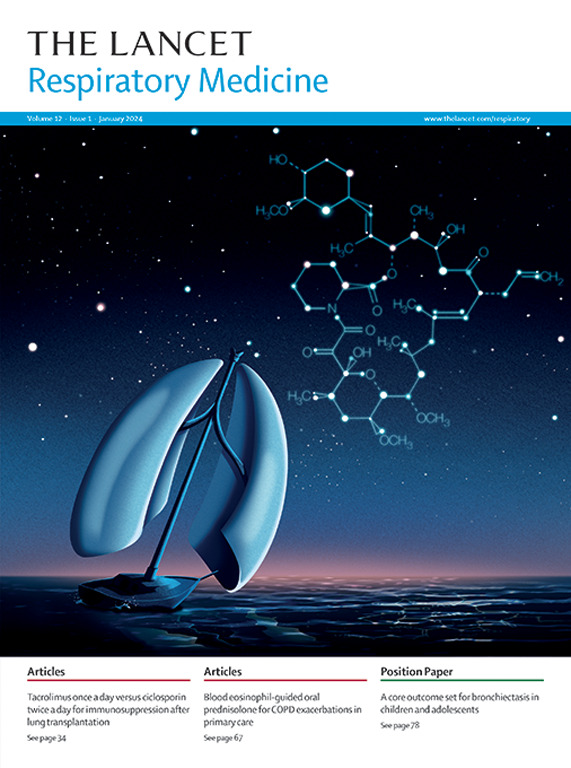Janus激酶抑制剂对因COVID-19住院的成年人的影响:随机临床试验的系统评价和个体参与者数据荟萃分析
IF 38.7
1区 医学
Q1 CRITICAL CARE MEDICINE
引用次数: 0
摘要
来自Janus激酶(JAK)抑制剂的随机临床试验(RCTs)的证据-与常规护理或安慰剂相比-在医院接受COVID-19治疗的成年人中是相互矛盾的。我们的目的是评估JAK抑制剂与安慰剂或常规治疗相比的利弊,以及预先指定的参与者亚组之间的治疗效果是否不同。方法在本系统评价和个体参与者数据荟萃分析(IPDMA)中,我们通过Ovid检索Medline,通过Elsevier检索Embase, Cochrane中央对照试验注册库,Cochrane COVID-19研究注册库和COVID-19 L·OVE平台,包括向后和向前引文检索(最后一次检索于2024年11月28日)。随机分配因COVID-19入院的成年人(年龄≥16岁)接受JAK抑制剂(任何类型)或不接受JAK抑制剂(即接受有或没有安慰剂的特定地点标准护理),并要求原始试验团队提供个人参与者数据(IPD)的随机对照试验(未发表或以任何格式和语言发表)。主要终点是随机分配后第28天的全因死亡率。我们采用了调整年龄和呼吸支持的两阶段荟萃分析,并使用随机效应模型进行汇总估计。个体水平效应调节因子的评估仅基于试验内信息,连续调节因子作为线性和非线性相互作用进行研究。我们使用评估效果修正分析可信度的工具来评估亚组分析,并使用建议分级评估、发展和评估方法来评判证据的确定性。第28天的3级或4级不良事件和严重不良事件,以及28天内特别关注的不良事件,作为次要结局进行评估。本研究已在PROSPERO注册(CRD42023431817)。我们确定了16项符合条件的试验。IPD来自12项试验,对应于2020年5月至2022年3月期间入院的12902名成年人。这些试验来自全世界所有符合条件的试验的13423名受试者中的12902名[96.1%]。7项试验评估巴西替尼,3项评估托法替尼,2项评估鲁索利替尼。总体而言,JAK抑制剂组6465名受试者中有755名(11.7%)在第28天死亡,而无JAK抑制剂组6108名受试者中有805名(13.2%)死亡(校正优势比[aOR] 0.67 [95% CI 0.55 - 0.82];高确定性证据;每1000人减少39人[95%可信区间55 - 21人])。JAK抑制剂减少了对新的机械通气或其他呼吸支持的需求,并允许更快地出院约1天。我们观察到JAK抑制剂组的3级和4级不良事件和严重不良事件较少(每1000例减少14例[95% CI减少24例至4例];moderate-certainty证据)。两组的特殊不良事件发生率相似。未发现通气状态、JAK抑制剂类型、合并症的存在、症状出现后开始治疗的时间、c反应蛋白浓度或同时使用地塞米松或托珠单抗对第28天死亡率有可信的亚组影响。我们发现了一个中等可信的年龄效应改变,年轻的参与者比年长的参与者表现出更大的相对治疗效果,但由于老年参与者的基线风险较高,绝对治疗效果相似。这项针对因COVID-19入院的成人的随机对照试验的IPDMA发现,与未使用JAK抑制剂相比,JAK抑制剂降低了所有呼吸支持水平的死亡率,不依赖于地塞米松或托珠单抗,并且可能减少了严重和严重不良事件。该项目已获得欧盟地平线2020研究和创新计划的资助,资助协议号为101015736。本文章由计算机程序翻译,如有差异,请以英文原文为准。
Effects of Janus kinase inhibitors in adults admitted to hospital due to COVID-19: a systematic review and individual participant data meta-analysis of randomised clinical trials
Background
Evidence from randomised clinical trials (RCTs) of Janus kinase (JAK) inhibitors—compared with usual care or placebo—in adults treated in hospital for COVID-19 is conflicting. We aimed to evaluate the benefits and harms of JAK inhibitors compared with placebo or usual care and whether treatment effects differed between prespecified participant subgroups.Methods
For this systematic review and individual participant data meta-analysis (IPDMA), we searched Medline via Ovid, Embase via Elsevier, the Cochrane Central Register of Controlled Trials, the Cochrane COVID-19 Study Register, and the COVID-19 L·OVE Platform, including backward and forward citation searching (last search Nov 28, 2024), for RCTs (unpublished or published in any format and any language) that randomly assigned adults (aged ≥16 years) admitted to a hospital due to COVID-19 to receive either a JAK inhibitor (any type) or no JAK inhibitor (ie, received site-specific standard of care with or without placebo), and requested individual participant data (IPD) from the original trial teams. The primary outcome was all-cause mortality at day 28 after random assignment. We used two-stage meta-analyses adjusting for age and respiratory support, and pooled estimates using random-effects models. The assessment of individual-level effect modifiers was based solely on within-trial information and continuous modifiers were investigated as both linear and non-linear interactions. We used the Instrument for Assessing the Credibility of Effect Modification Analyses to appraise the subgroup analyses and the Grading of Recommendations Assessment, Development, and Evaluation approach to adjudicate the certainty of evidence. Grade 3 or 4 adverse events and serious adverse events by day 28, and adverse events of special interest within 28 days, were assessed among secondary outcomes. This study was registered with PROSPERO (CRD42023431817).Findings
We identified 16 eligible trials. IPD were obtained from 12 trials, corresponding to 12 902 adults admitted to hospital between May, 2020, and March, 2022. These trials represented 12 902 [96·1%] of 13 423 participants from all eligible trials worldwide. Seven trials evaluated baricitinib, three evaluated tofacitinib, and two evaluated ruxolitinib. Overall, 755 (11·7%) of 6465 participants in the JAK inhibitor group died by day 28 compared with 805 (13·2%) of 6108 participants in the no JAK inhibitor group (adjusted odds ratio [aOR] 0·67 [95% CI 0·55–0·82]; high-certainty evidence; 39 fewer per 1000 [95% CI 55 fewer to 21 fewer]). JAK inhibitors decreased the need for new mechanical ventilation or other respiratory support and allowed for faster discharge from hospital by about 1 day. We observed fewer grade 3 and 4 adverse events and serious adverse events in the JAK inhibitor group (14 fewer per 1000 [95% CI 24 fewer to 4 fewer]; moderate-certainty evidence). The rates of adverse events of special interest were similar across both groups. No credible subgroup effect on mortality at day 28 was found for ventilation status, type of JAK inhibitor, presence of comorbidities, timing of treatment initiation after symptom onset, C-reactive protein concentration, or concomitant use of dexamethasone or tocilizumab. We found a moderately credible effect modification by age, with younger participants showing larger relative treatment effects than older participants, but similar absolute treatment effects due to higher baseline risk for older participants.Interpretation
This IPDMA of RCTs in adults admitted to hospital due to COVID-19 found that JAK inhibitors reduced mortality across all levels of respiratory support, independent of dexamethasone or tocilizumab, and probably decreased serious and severe adverse events compared with no JAK inhibitors.Funding
This project has received funding from the EU's Horizon 2020 research and innovation programme under grant agreement number 101015736.求助全文
通过发布文献求助,成功后即可免费获取论文全文。
去求助
来源期刊

Lancet Respiratory Medicine
RESPIRATORY SYSTEM-RESPIRATORY SYSTEM
CiteScore
87.10
自引率
0.70%
发文量
572
期刊介绍:
The Lancet Respiratory Medicine is a renowned journal specializing in respiratory medicine and critical care. Our publication features original research that aims to advocate for change or shed light on clinical practices in the field. Additionally, we provide informative reviews on various topics related to respiratory medicine and critical care, ensuring a comprehensive coverage of the subject.
The journal covers a wide range of topics including but not limited to asthma, acute respiratory distress syndrome (ARDS), chronic obstructive pulmonary disease (COPD), tobacco control, intensive care medicine, lung cancer, cystic fibrosis, pneumonia, sarcoidosis, sepsis, mesothelioma, sleep medicine, thoracic and reconstructive surgery, tuberculosis, palliative medicine, influenza, pulmonary hypertension, pulmonary vascular disease, and respiratory infections. By encompassing such a broad spectrum of subjects, we strive to address the diverse needs and interests of our readership.
 求助内容:
求助内容: 应助结果提醒方式:
应助结果提醒方式:


